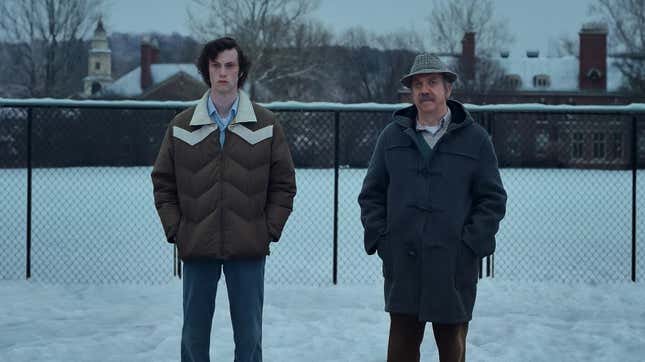
Don’t let the wintry backdrop of Alexander Payne’s latest fool you, for The Holdovers is a warm honeyed cider of a film. That’s no mean feat considering the holiday-set comedy-drama is anchored by a crotchety instructor at a New England prep school with a habit of calling his students “rancid philistines” and who is tasked with looking over the students who have nowhere to go during the winter break of 1970. But beneath the prickly exterior of its central character (played by Sideways’ Paul Giamatti) is an unwaveringly gentle film about the very need for that gentleness—with others and, perhaps more importantly, with ourselves.
From the ’70s-styled title cards for Focus Features and Miramax that open the film, Payne envelops you in the postcard-ready winter at Barton. The all-boys boarding school where young men from affluent families go on their way to Yale, Harvard, Cornell, and the like is, according to Giamatti’s Paul Hunham, a breeding ground for entitled brats in dire need of being put in their place. And that’s what he relishes doing in his Ancient Civilizations class, where his pedagogical approach is a blend of condescension and disdain. With no social life to speak of and utter contempt for the students he’s surrounded by on campus, Paul is both the best and last choice to play chaperone to the quartet of Barton boys who, for varying reasons, have no Christmas plans to speak of. Joining them as well is Angus Tully (Dominic Sessa, in his feature debut), who is left adrift at Barton at the last minute by a mother who’s all too eager to start her life afresh with her rich new husband, sparing little sympathy for the son she’s stranding in the process.
The start of the film alternates between lovely vignettes that give us a glimpse into the Barton world Angus and Paul both ill-fittingly call home (the school choir rehearsing, a somber holiday mass) and somewhat clunky expository scenes where we learn not just about Angus’ family but also about how the school’s head cook, Mary (the luminous Da’Vine Joy Randolph), lost her son in Vietnam. Its first third also focuses on how the many boys and men who populate Barton are, to use a word the film returns to time and again, assholes. Angus’ classmate Teddy Kountze (Brady Hefner) thrives on bullying, while Angus himself, clearly wounded by his mother’s cold shoulder, enjoys berating others and having an all-around foul attitude wherever he goes; and that’s nothing compared to how Paul opts to run the holiday break at Barton, staging it like a long-drawn-out detention where little room is made for fun or amusement. “Adversity breeds character!” is a mantra he all but inflicts on others, a lesson he’s learned the hard way, perhaps.
Such a grating start (How enjoyable would it be to spend an entire film marooned in a snowy prep school with assholes wanting to make each other’s lives miserable lest they look within to find out what drives them to bully, needle, or drink?) eventually mellows into a much more humanist portrait of what makes an asshole an asshole. To do that, though, Payne, working from an original script by David Hemingson, needs to whittle down the film’s cast and setting. So it takes a while for The Holdovers to arrive at its central conceit: Mary, Angus, and Paul will be living at Barton by themselves through the two-week holiday break (the way in which the other boys end up leaving the school grounds is one needless plot machination that’s thankfully absent from the rest of the film).
Once Payne lands on the trio forming a makeshift family for the holidays, The Holdovers takes flight. Isolated from the world at large, which all three are happy to disavow for various reasons, the student, the teacher, and the cook open up to one another, learning about themselves and how to live in a rapidly changing world that leaves little room for each to mourn what they had, what they cherished, what they’ve lost. Mary’s grief may be the way the film does this most obviously, with Randolph masterfully lacing her no-nonsense character’s wry melancholy with enough rancor to avoid the sentimentality her story would otherwise fall prey to. But as Angus and Paul move from embittered scholastic adversaries to begrudging mates with clear affection for one another, their journey unmasks secrets they’ve been hiding from others and from themselves—the better to cope with days that feel hard to get through in a normal time, let alone a festive one like Christmas.
The Holdovers may peg its tale on a truism that can feel trite (you never know what others are going through). But Payne, Hemingson, and its central trio of actors find welcome nuances within that platitude. On paper, this may sound like yet another holiday tale about a curmudgeon having his heart thawed by encounters that force him to examine his past, present, and future. On screen, though, the story emerges as something much thornier and gentler. Laced with questions about mental health, trauma, privilege, and entitlement that are rightly anchored in its 1970 setting but which ring all the more true in 2023, Payne reaches for a simple imperative to leave us with: let us be gentle with others (and ourselves) lest we build a world where only assholes are allowed to thrive.
The Holdovers opens in theaters in New York and Los Angeles on October 27 and nationwide on November 10.